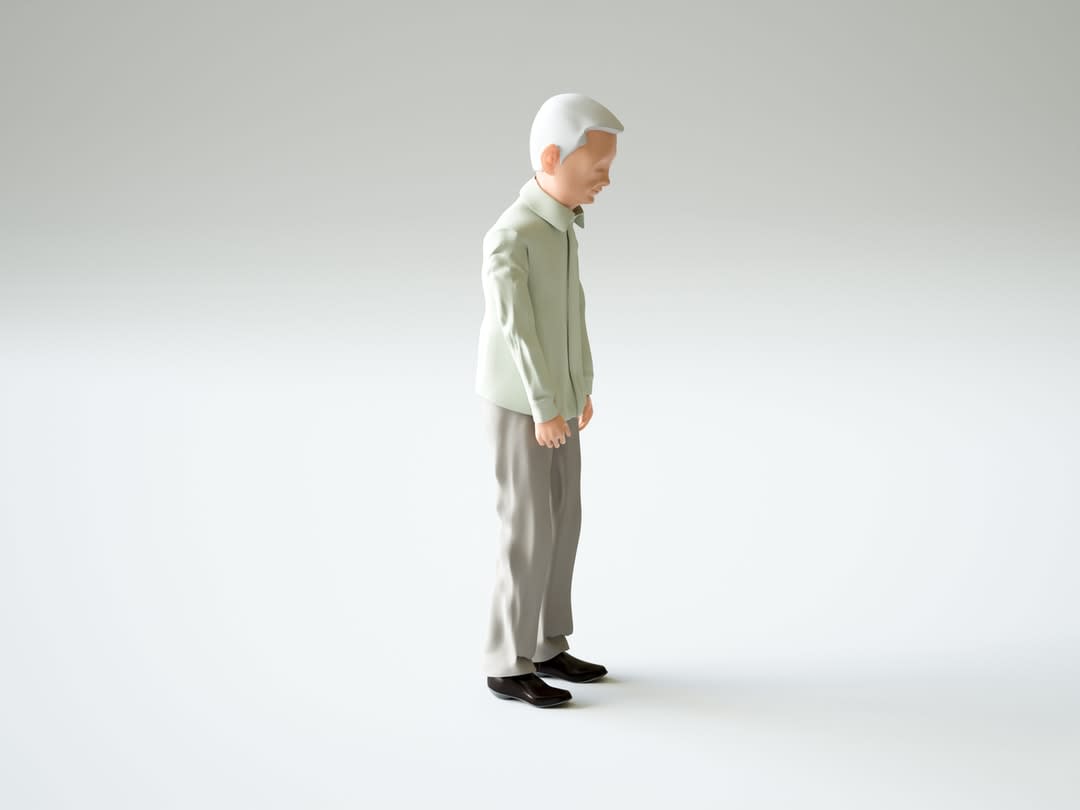Loneliness in later life is not an easy or upbeat topic. It kills, and makes our older people sick; it can lead to premature mortality, and increase the risk of diseases that demand long-term care, such as dementia.
When you feel lonely you feel that you lack companionship, you experience an absence of close relationships, of meaningful conversations, of opportunities to share your life, and to feel like you belong; like you matter.

You can live with others and feel lonely, because loneliness relates to an absence of social connectedness that is, of meaningful relationships. Loneliness is a subjective feeling of lacking companionship, of missing out, of not fulfilling social needs.
A recent global study estimates that between 35 per cent to 61 per cent of older people in aged care facilities feel lonely, which is considerably higher than for those living in the community or the general population.
In Australia, we lack precise figures, but it seems that more than 40 per cent of aged care residents didn’t get any visitors before the pandemic. The Royal Commission into Aged Care Quality and Safety highlighted in its final recommendations that loneliness is a significant issue that must be urgently tackled – in fact, the commission reports that levels of loneliness among residents have increased since March 2020.
During the 2020 COVID-19 pandemic, loneliness was the most common stressor for younger people, too, proving that loneliness can affect all of us.
The consolation of literature
As a way of coping with the cruelties of the pandemic – with the isolation, the lockdowns, the loss, the uncertainty – many of us turned to the consolations of literature. “Pandemic reading”, “escapist literature”, “pandemic bookshelf” all entered the vocabulary of readers around Australia and the world.

Book sales soared; bucket lists of “to-be-read” novels became popular; reading habits changed. COVID-19 showed us we need literature to help with a dire reality that we still have trouble describing.
I’ve been studying ageing and loneliness for years, and it occurred to me: Could we use creative writing to better analyse and represent the experiences of loneliness among older people in Australian care homes?
Could it be used to counter the ageism that is so ingrained in society? That ageism that contributes to both the loneliness among people in aged care, and to the social stigma of being old and frail?
Before the pandemic hit us, I was reading Extinctions, a book by Australian writer Josephine Wilson. She received the prestigious Miles Franklin Literary Award for the novel, which explores numerous critical topics, including ageing, aged care, and loneliness.
I was touched by the book’s narrative and how it rejected the common old-age tropes – the older characters in the stories were complex, not put into the little boxes that are used to portray later life as grumpiness, as a cost, a societal problem, a personal nightmare.
Yes, older characters had to deal with health and social challenges. And yes, they faced the pervasive ageism entrenched in a society obsessed with youthfulness, they coped with living in care homes, they reflected on their life choices but they did not just become a cost or a problem for the rest of us to deal with.

As with feeling old in a society that devalues ageing, feeling lonely can be analogous to feeling “extinct”. But Josephine didn’t portray loneliness as an individualised problem that the person has suddenly the power to solve on their own if they’re just more “positive” or “resilient”; loneliness was rightfully recognised as a multilayered social issue.
I reached out to Josephine to see if she could help me amplify the voices of participants in my studies. Could we use creative writing to convey in a respectful and empathic way their loneliness? Could literature enhance our understanding of loneliness, just as it did for many through the COVID-19 pandemic?
Josephine accepted my invitation. She immersed herself in interviews with older people feeling lonely, poring through the recordings, transcripts, and field notes of our six-month observations in two Victorian care homes. This collaboration has been canvassed in this scientific article.
As one of the participants noted: “With loneliness, you can’t do it alone.” The same must be said of ageism it takes more than a village to destigmatise loneliness and ageing.
The first step is awareness.
Below is one of Josephine’s stories, about Gurney*, one of the loneliest of our participants.
Gurney’s story, by Josephine Wilson
Some say old age is a narrative of steady decline, with a sudden foreclosure at the end, like a house unexpectedly taken from you by the bank.
Gurney is 90. For 23,725 days Gurney slept with his wife, but now he sleeps alone.
Gurney came from England in his 30s, after working as a traffic officer for the police. Gurney had a house, a mortgage, a temporary job as a cleaner in a hospital that became permanent. He had a job for life, as they used to say. And then he retired and his job ended. And so, it seems, did that particular story.
Gurney has been in the aged care facility for seven years. His wife was here, too, but then she died. Everything has changed since he moved here, says Gurney.
Gurney describes life as boring. The word is used several times in the record: boring, boring, boring. It is a common word that is easy to pass over, describing a minor emotional state. The word suggests a lack of resources or will, rather than anything more consequential. Toddlers get bored; children on summer holidays get bored; high school maths teachers can be boring. But Gurney is neither a kid, nor on holidays, nor in high school. He is 90 years old, and he sleeps alone.
“Boredom,” writes Lars Svendsen, “always contains an awareness of being trapped, either in a particular situation or in the world as a whole.” Gurney says he is bored; perhaps he is really saying he is trapped in the aged care home, with no means of escape, and no-one to rescue him.
I’m lonely, says Gurney, the more I’m stuck inside this dump.
A carefully chosen word: dump. It is a word you might use to describe the kind of temporary accommodation you never would have chosen had you known better. The hotel turned out to be a dump. The rental was a dump. It is hard to imagine Gurney describing his family home as a dump.
How is it that Gurney ended up so lonely? Gurney had two sons; one has died but we learn no details. The other one lives in Scotland, which is a very long way from Gurney.
Gurney does not feel lonely right now because he is having a conversation. Gurney clearly has a lively mind. Gurney would like to contribute. Gurney tries to speak to staff, but he says they don’t listen; he blames the stigma of old age.
Who listens to old people anyway?
Gurney feels most lonely at night, when he gets into bed alone.
Gurney says he never goes out of the home.
Never?
No, never!
He had to sell the car due to vertigo.
Gurney does not have much, but he possesses two very important things that he brought with him from the past and which might ensure his escape in the future. Gurney has a hobby and a dry sense of humour. When asked what he would most like to do, Gurney says: join a youth club and go roller skating. Bingo, he announces, is sex for old people.
Gurney is interested in aviation. He has a computer with a flight simulator. In theory, Gurney can go wherever he wants. In theory, he is at the controls; he can gain altitude to avoid turbulence. Who knows if bad weather lies ahead?
He would like more privacy. He met a lady in the home who had her pilot’s licence, and they moved in close, and then, he says, they moved her.
Did I tell you she died?

Gurney flies from loneliness
One day Gurney woke up from a troubled dream and found himself not in his single bed topped with a rubber sheet, but in the cockpit of a Cessna 172 Skyhawk, gaining altitude. It was sunset and already the first stars were nibbling small holes in the corner of the sky. He leant into the yoke, checked the ailerons, and banked. He could just make out the outline of the so-called “Home” where he had been trapped for seven years. Well, he wouldn’t be going back there. Foxtrot Uniform!
He checked his fuel a full tank and turned north towards the future. Without even knowing it, Gurney had been preparing for this moment his whole life. Far from wasting all those years on his computer game in the spare bedroom while his wife cooked dinner, he had been preparing to take the controls.
Those thousands of hours he had clocked up on the simulator were not for nothing: the past, the present, the future had miraculously converged in the cockpit.
Gurney gave his “Home” the two-fingered salute.
He’d show them he was not just some sad, doddery, crotchety 90-year-old man whose wife of 65 years had died, who lived on the other side of the world from his remaining family and who spent his days complaining about occupational health and safety standards to anybody who would listen, which was exactly nobody.
Gurney was at the controls, on the deck, and he was master of his destiny. No more doors wedged open so the staff could duck their heads into his room to tick off that box on their sheet to confirm No. 7 was still upright, semi-sentient and half-alive! No more bed baths. No more pureed food eaten under neon. No more cold tea and cheap biscuits. No more Bingo.
Bingo!
* Not his real name.
This work is based on research conducted by Barbara Barbosa Neves (Monash University), Alexandra Sanders, and Renata Kokanovic (RMIT).
This article was first published on Monash Lens. Read the original article
How have you managed loneliness? Why not share your stories with our members in the comments section below?
If you enjoy our content, don’t keep it to yourself. Share our free eNews with your friends and encourage them to sign up.

